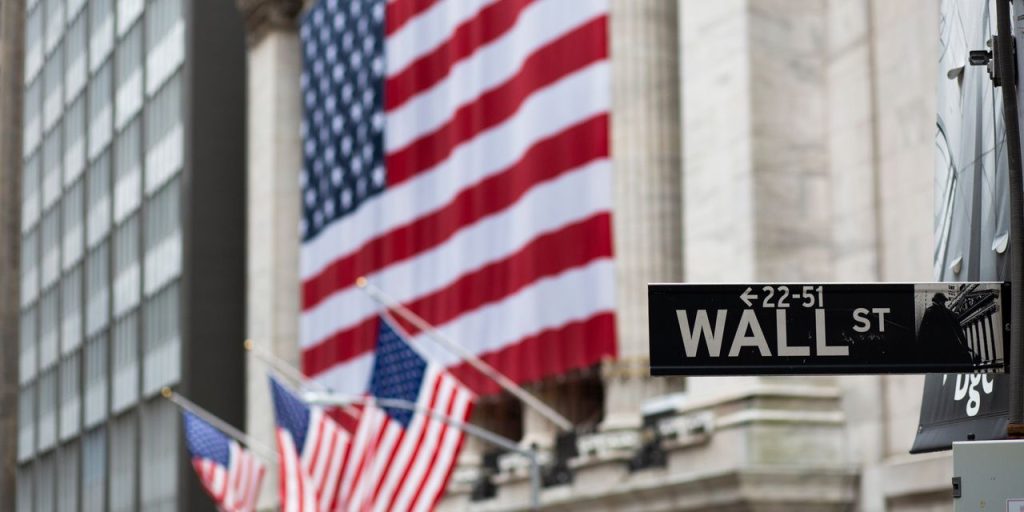U.S. stock indexes traded mostly higher on Tuesday as investors cautiously looked ahead to March’s inflation data due Wednesday that could determine the Federal Reserve’s next interest-rate move, as well as to the start of the corporate earnings reporting season on Friday.
How are stock indexes trading
-
The S&P 500
SPX,
+0.30%
rose 14 point, or 0.4%, to 4,123 -
Dow Jones Industrial Average
DJIA,
+0.53%
added 176 points, or 0.5%, to 33,763 -
Nasdaq Composite
COMP,
-0.12%
dropped 3 points, or less than 0.1%, to 12,081
On Monday, the Dow Jones Industrial Average rose 101 points, or 0.3%, to 33,587, the S&P 500 increased 4 points, or 0.1%, to 4,109, and the Nasdaq Composite dropped 4 points, or 0.03%, to 12,084.
What’s driving markets
Wall Street’s main stock indexes mostly advanced Tuesday afternoon, as investors awaited the release of March’s consumer price index and the start of the first-quarter earnings season, with the banking sector slated to report numbers later this week.
The S&P 500 index sits less than 0.5% off its best level since mid-February as investors have become more relaxed about prospects for the U.S. economy and more accepting of the path of Federal Reserve policy.
The March employment report released last Friday showed a steady pace of job creation but with no great sign of accelerating wage inflation, which helped calm fears of a sharp economic slowdown and faster Fed interest rate hikes.
See: Why March’s CPI report could upset the stock market, seal the deal on the next rate hike
But now attention turns to the March’s consumer price index report due Wednesday, which is seen as one of the last key data points before the Federal Reserve’s next interest-rate move.
The March CPI reading from the Bureau of Labor Statistics, which tracks changes in the prices paid by consumers for goods and services, is expected to show a 5.2% rise from a year earlier, slowing from a 6% year-over-year rise in the previous month, according to a survey of economists by Dow Jones.
Core CPI, which strips out volatile food and fuel costs, is expected to rise 0.4% from a month ago, or 5.6% year over year. The increase in the core rate over the 12-month period dipped to 5.5% in February.
Meanwhile, data from China on Tuesday showing consumer inflation dipped to its lowest level in more than a year in March, is also helping ease fears about global price pressures.
Investors are wondering whether the Fed is satisfied with what it has done to fight inflation, and whether the central bank has done too much that it would drag the U.S. economy into a recession, according to Kristina Hooper, chief global market strategist at Invesco.
“Tomorrow’s data point will only help us answer that first question,” Hopper said. Meanwhile, “while CPI is important, it’s just one data point. Hopefully it will confirm what we’ve seen with other data points that there’s significant progress in fighting inflation, and hopefully that’s enough to satisfy the Fed,” Hooper said in a call.
Seema Shah, chief global strategist at Principal Asset Management, expects the decline in inflation in 2023 will likely be “incomplete with inflation remaining above central bank targets,” complicating its policy decisions.
“Global inflation is moderating, but so far this deceleration has been largely driven by last year’s energy price spike unwind. Core inflation remains uncomfortably high and, in some economies, continues to rise,” Shah said in emailed comments on Tuesday.
“Central banks have made less progress towards disinflation than they had hoped. Inflation is likely to remain sticky and will still sit above central bank targets at year-end,” Shah said.
See: High inflation and interest rates to hobble U.S. and global economies for several years, IMF says
The U.S. and global economies are likely to struggle to grow over the next few years as countries fight to reduce high inflation and cope with rising interest rates, the International Monetary Fund said Tuesday.
Meanwhile, the IMF said recent stress in the banking sector could reduce the ability of U.S. banks to lend over the next year, and materially lower U.S. economic growth.
The IMF estimated that lending capacity in the U.S. could fall by almost 1% in the coming year. That would reduce U.S. real gross domestic product by 44 basis points over that time frame, all else being equal, the IMF said.
See: Why a long, shallow recession is more likely than ‘deep and long credit crunch contraction,’ says Mizuho
Then, on Friday, the first-quarter corporate earnings season kicks into gear with the’ financial sector in the vanguard.
It’s particularly important to pay attention to earnings calls and guidance provided by companies’ management, noted Hooper. “That to me is where we’re likely to get the best insights or at least the most robust insights into current credit conditions, to understand what could happen to the economy,” Hooper said.
Philadelphia Fed President Harker will be speaking at 6:30 p.m. and Minneapolis Fed President Kashkari is due to speak at 7:30 p.m. Both times Eastern.
Companies in focus
-
Shares in WW International Inc.
WW,
+64.81% ,
the parent company of WeightWatchers, soared 51% in afternoon trading after announcing that it had closed its deal to acquire telehealth company Sequence. -
Tesla Inc.‘s stock
TSLA,
+1.71%
moved up over 1.9%, reversing its bad week last week, where shares sank over its price cut measures across its electric vehicle lineup. -
CarMax Inc.’s stock
KMX,
+10.45%
climbed 10.9%, enough to pace the S&P 500 index’s
SPX,
+0.30%
gainers, after the used-car retailer revealed fourth-quarter profit that was a more than double than expected, despite reporting worse than expected revenue. -
National CineMedia Inc. shares
NCMI,
+53.16%
shot up 58% after movie theater operator AMC Entertainment Holdings Inc.
AMC,
+5.25%
disclosed that it has taken a 9.1% stake in the cinema advertising platform. AMC shares jumped 5.9%. -
Moderna Inc. shares
MRNA,
-2.30%
shed 2.7% to lead the S&P 500’s losers after the biotechnology company provided clinical and program updates for investors at its Vaccines Day, and said it was working to develop its first bacterial vaccine to protect against Lyme disease. -
Shares of Newmont Corp.
NEM,
-1.83%
declined nearly 2% after the gold producer raised its takeover offer for Australia-based Newcrest mining to around $19.6 billion. The miner had rejected the previous offer of $17 billion in February. Newcrest’s
NCM,
+5.16%
stock rose over 5% in Sydney trading. -
Virgin Orbit Holdings Inc.’s stock
VORB,
-26.27%
plunged 32% premarket after announcing last Monday that the exchange would delist the space launch companies’ shares after it filed for Chapter 11 bankruptcy protection last week.
— Jamie Chisholm contributed to this article
Read the full article here
















